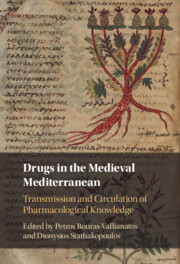Book contents
- Drugs in the Medieval Mediterranean
- Drugs in the Medieval Mediterranean
- Copyright page
- Contents
- Figures
- Tables
- Contributors
- Acknowledgements
- Note to the Reader
- Medieval Mediterranean Pharmacology
- Part I Transmission of Pharmacological Knowledge
- Part II The Borders of Pharmacology
- Chapter 7 Making Magic Happen
- Chapter 8 Remedies or Superstitions
- Chapter 9 When the Doctor Is Not Around
- Chapter 10 Digestive Syrups and After-Dinner Drinks
- Chapter 11 Late Byzantine Alchemical Recipe Books
- Chapter 12 Making Connections between the Medical Properties of Stones and Philosophy in the Work of Albertus Magnus
- Chapter 13 Healing Gifts
- Index
- References
Chapter 9 - When the Doctor Is Not Around
Arabic-Islamic Self-Treatment Manuals As Cultured People’s Guides to Medico-pharmacological Knowledge. The Mamluk Period (1250–1517)
from Part II - The Borders of Pharmacology
Published online by Cambridge University Press: 19 October 2023
- Drugs in the Medieval Mediterranean
- Drugs in the Medieval Mediterranean
- Copyright page
- Contents
- Figures
- Tables
- Contributors
- Acknowledgements
- Note to the Reader
- Medieval Mediterranean Pharmacology
- Part I Transmission of Pharmacological Knowledge
- Part II The Borders of Pharmacology
- Chapter 7 Making Magic Happen
- Chapter 8 Remedies or Superstitions
- Chapter 9 When the Doctor Is Not Around
- Chapter 10 Digestive Syrups and After-Dinner Drinks
- Chapter 11 Late Byzantine Alchemical Recipe Books
- Chapter 12 Making Connections between the Medical Properties of Stones and Philosophy in the Work of Albertus Magnus
- Chapter 13 Healing Gifts
- Index
- References
Summary
As a subgenre of the Arabic medical literature of the Islamic Middle Period, the self-treatment compendia seem to have escaped the notice of contemporary scholarship. Meant for domestic use by Arabic-speaking, cultured urbanites, the compendia dealt with the cure and prevention of diseases. As such, they promoted a well-defined set of concepts and, at the same time, reflected medicine-related convictions, knowledge, and intellectual tradition prevailing not only among physicians, but also among educated non-professionals. While taking into consideration a number of Arabic-Islamic self-treatment compendia, the chapter focuses on two specific texts, one of which was written in fourteenth-century Cairo. The provenance of the other cannot be securely defined. The analysis of the manuals’ texts is focused, above all, on investigating cultural and intellectual influences which, through the transfer and assimilation of drugs and drug-related ideas, contributed to shaping the overall medico-pharmaceutical culture of the Mamluk Near East.
Keywords
- Type
- Chapter
- Information
- Drugs in the Medieval MediterraneanTransmission and Circulation of Pharmacological Knowledge, pp. 291 - 319Publisher: Cambridge University PressPrint publication year: 2023

